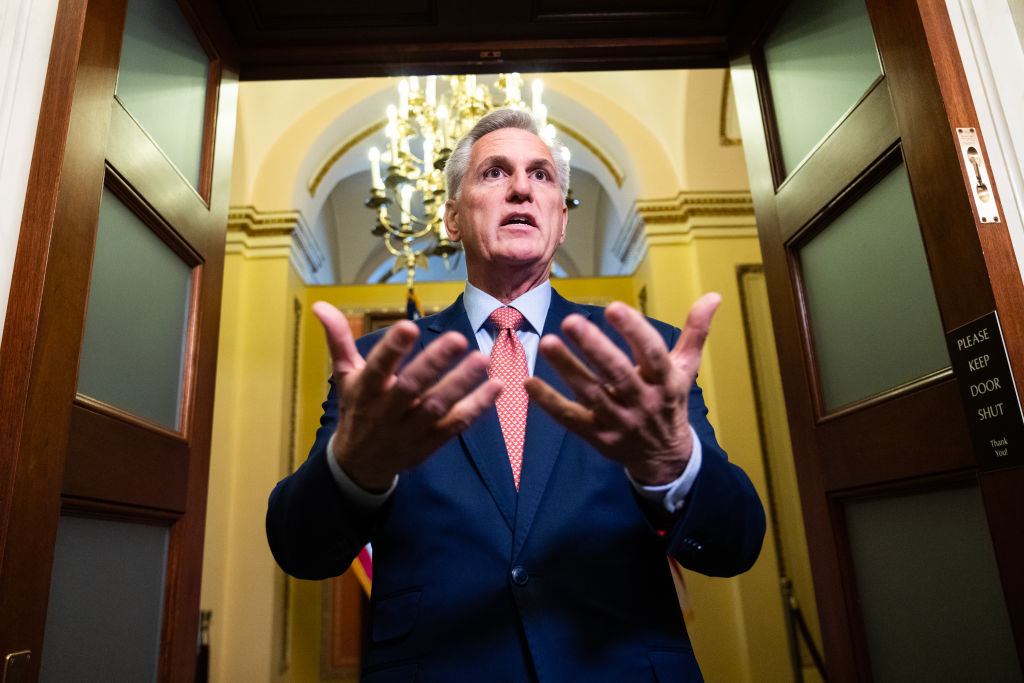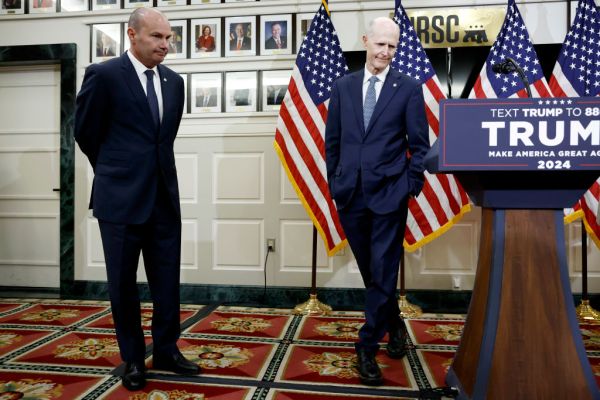The odds of Congress passing a 2024 budget before September 30—the end of the current fiscal year—look increasingly slim, especially after the Biden administration’s new Ukraine funding request.
During a mid-recess conference call for GOP House members Monday, Speaker Kevin McCarthy told lawmakers he anticipates the House and Senate will need to agree on a short-term continuing resolution (CR) to avert a shutdown while negotiations on appropriations bills continue. “I do expect a short-term CR will be needed to finish all the work that we set out to do,” McCarthy said, according to the Washington Examiner. He reportedly anticipates the continuing resolution would only last through early December.
But recent developments are likely to make McCarthy’s task of wrangling a fractious caucus even more difficult.
Last week, the Biden administration proposed a $40 billion supplemental emergency funding request,$24 billion of which would go toward supporting the Ukrainian war effort, with about $13 billion for defense efforts and $11 billion for humanitarian aid and economic assistance. The White House also wants another $12 billion to bolster the Federal Emergency Management Agency’s (FEMA) relief efforts during hurricane season, as well as another $4 billion to address issues related to the southern border—including shelters for migrants and efforts to counter the fentanyl trade. The emergency request would not count toward the annual budget caps agreed to by McCarthy and President Joe Biden during this year’s debt ceiling negotiations, making a stopgap measure the most likely vehicle for its passage.
The request has irked House Republicans, as it could force them to vote on an issue that divides their conference. McCarthy was critical of the Biden administration on Monday’s call for not discussing the supplemental package with Republican lawmakers before making it public, a claim White House officials told Punchbowl News was inaccurate.
Congress approved over $113 billion in aid and military assistance in 2022, according to the Committee for a Responsible Federal Budget. On Monday, the Pentagon announced it would send $200 million in security assistance to Ukraine, pulling from previously appropriated aid. The assistance comes in the form of additional munitions for air defense systems, artillery rounds, tactical vehicles, and mine clearing and other field equipment. Appropriated funds are waning and expected to last only until government funding runs out in the fall: The recently announced aid came about after the Pentagon found it had overvalued some of the aid sent to Ukraine and now had an additional $6.2 billion of funds.
While continuing to support Ukraine is a popular position among most Republicans—particularly in the Senate—a vocal faction of GOP lawmakers have steadily railed against sending any additional aid. Although an amendment to an annual defense policy bill last month that would’ve cut off all aid to Ukraine failed, 70 out of 219 House Republicans who voted on the measure were in favor of it. “Congress should not authorize another penny for Ukraine,” Rep. Marjorie Taylor Greene, a far-right Republican, said when announcing a similar amendment during a House Rules Committee meeting. That amendment failed on the floor by a 358-89 vote.
Biden’s supplemental funding request received a similar reception from these lawmakers. “While the border remains wide open, crime in major cities is out of control, and Americans cannot afford daily necessities—Biden wants $24 billion MORE for Ukraine,” Rep. Bob Good of Virginia said last week.
But for now, at least, lawmakers like Greene and Good remain in the minority among House Republicans. “It is in our national interests that Russians are defeated in their barbaric unprovoked invasion,” Rep. Don Bacon of Nebraska told The Dispatch on Monday. He wants additional details on exactly what the administration plans to spend the aid money on, but he’s in favor of the idea. “Bottom line, I’ll support Ukraine aid, but I’ll want to ensure we’ve spent what has been appropriated and that it is the right kind of aid that Ukraine needs.”
The clock is ticking: Funding for the government will need to be in place before the start of the new fiscal year October 1. By the time the House reconvenes from its summer recess on September 5, lawmakers will have about a dozen days in session to pass all 12 appropriations bills or approve an extension of current government funding levels while lawmakers continue to negotiate. (McCarthy promised Republicans that this year they will aim to pass the budget through regular order—which means passing the 12 appropriations bills that fund the various government programs and agencies separately rather than pushing through a massive omnibus package.) The Senate—which returns to D.C. the week of September 12—faces an even tighter squeeze.
So far, the House has approved just one of the 12 appropriations bills. While the bills are moving through the committee process, a group of House Freedom Caucus members are threatening to withhold their support from legislation they say cost too much. “I don’t believe we should agree to a [continuing resolution] on September 30,” Rep. Chip Roy of Texas reportedly said during a recent Twitter Spaces event. Conservatives, he added, should “hold the line” as a way to force policy wins.
McCarthy has already meted out some wins to that flank of the party, but those concessions have left the House and Senate on different pages when it comes to topline numbers. After some House conservatives decried a deal McCarthy cut with Biden in May to raise the debt ceiling, the speaker agreed to write most appropriations bills at much lower, fiscal year 2022 numbers. The Senate, however, has largely ignored the House and opted to write its appropriations bills to the budget targets agreed to in the debt ceiling deal.
With so many plates spinning at once, it’s no wonder some Republicans are openly predicting a government shutdown this fall. “It’s clear President Biden and Speaker McCarthy want a government shutdown, so that’s what Congress will do after we return in September,” Rep. Tony Gonzalez, a moderate from Texas, tweeted on Monday. “Everyone should plan accordingly.”









Please note that we at The Dispatch hold ourselves, our work, and our commenters to a higher standard than other places on the internet. We welcome comments that foster genuine debate or discussion—including comments critical of us or our work—but responses that include ad hominem attacks on fellow Dispatch members or are intended to stoke fear and anger may be moderated.